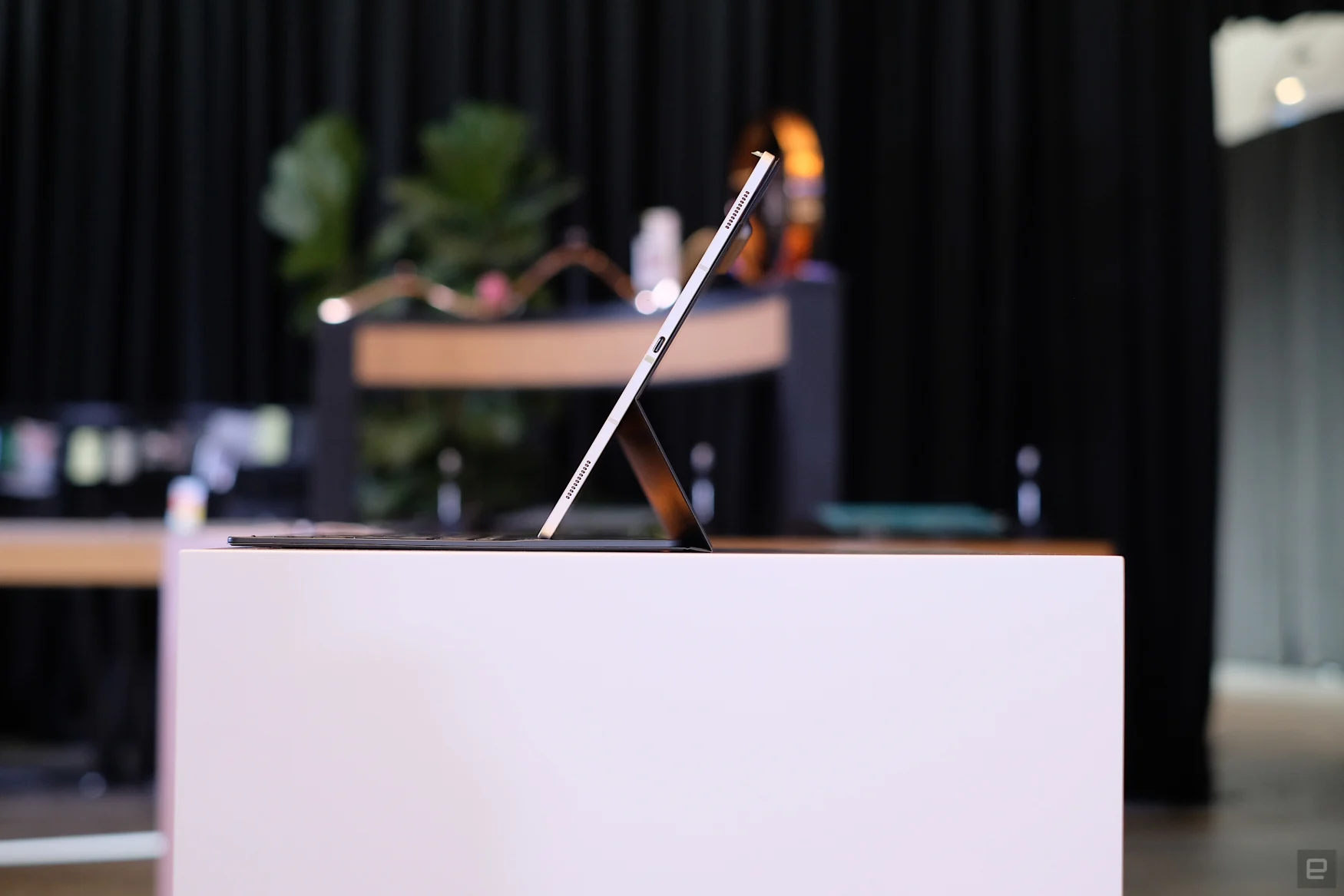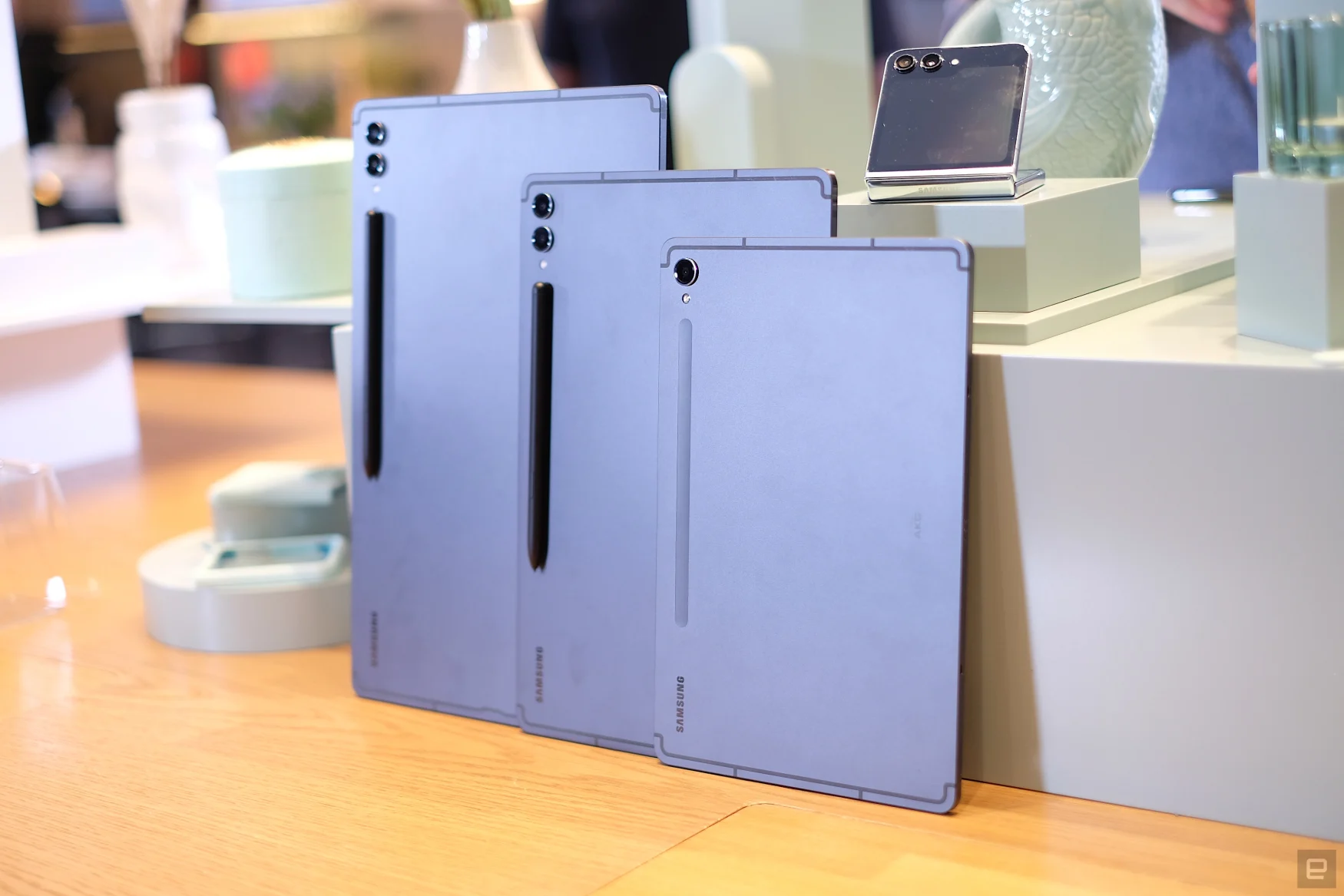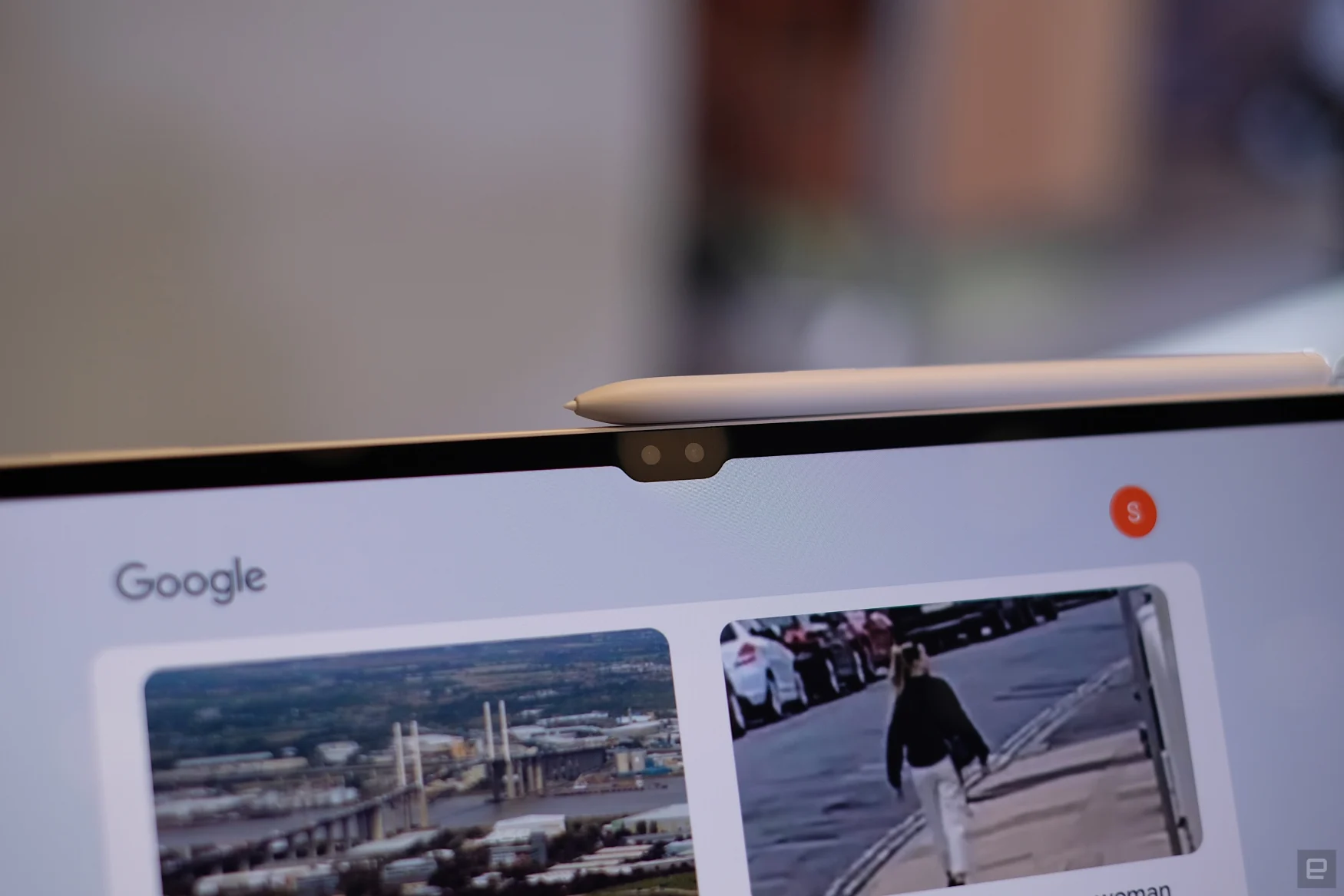
This year’s Galaxy Unpacked foldable showcase is more of a Samsung eco-system barrage. Two foldables, two wearables, and no fewer than three tablets are here to tempt you to stick with the Galaxy family (or jump ship from rivals like Apple and Google.) While the fourth-generation foldables are arguably the big reveals, Samsung’s latest flagship tablet, the Galaxy Tab S9 Ultra, is making its case for a premium Android tablet.
The flagship Galaxy Tab S9 is only the company’s second “Ultra” tablet, and there are many similarities to last year’s Tab S8 Ultra, with its 16:10 screen, dual-camera array on the back and magnetized stylus holster. This time, you can attach the stylus in either direction on the holster, and it’ll still charge – an odd oversight on the previous model.

Design-wise, it’s more of the same for Samsung’s tablet: More smooth aluminum frames but with slimmer bezels. They’re still thin and feel incredibly premium, especially the wide-screen Ultra. The Tab S9 Ultra feels a little unwieldy in my hands, partially due its taller screen ratio, which I’m not used to. Also because it’s almost 13 inches wide.
At least it’s gorgeous. Samsung has evolved the displays on its tablets even further, with the ninth-generation tablets all using Dynamic AMOLED 2X displays, like those found on its most powerful (and expensive) Galaxy S phones and Galaxy Book Ultra laptops. The Tab S9 Ultra has a 14.6-inch AMOLED display, capable of reaching 120Hz and supporting HDR 10+. While I’ll focus on the Ultra model, the Galaxy Tab S9+ with its 12.4-inch display and Tab S9 with its 11-inch screen also get the same beefed-up AMOLED tech.
Unsurprisingly, the screens are all vivid and high-contrast – it’s Samsung’s strength right here. I had to reduce the screen’s brightness pretty substantially just to capture images of the Tab S9 Ultra. Once again, the Galaxy Tab Ultra model comes with a notch – gasp – which appears to be dual 12-megapixel cameras. (There are a few specs we’re double-checking with Samsung.) The tablets also pack four AKG-tuned speakers, and if you’re planning to watch a lot of movies, shows or games, there’s also support for Dolby Atmos.
Beyond the display, Samsung has made two other major upgrades to the Tab S9 series. First up is IP68 dust and water protection to all the new tablets. Samsung says this means it should survive depths up to 1.5 meters of water, while it’s also launching a ruggedized cover (pricing TBD) to make the most of the tab’s new hardy bona fides.

Samsung has also improved the processor for 2023 and its tablets all use Qualcomm’s Snapdragon 8 Gen 2. The company claims some major performance improvements compared to last year’s Tab S8, including up to 32 percent improved CPU and 41 percent better GPU performance. Both the Tab S9+ and Tab S9 Ultra will be able to fast-charge at up to 45W, although only the Tab S9 Ultra will come with the compatible charging brick. That’s why it’s the Ultra, people. Both of the larger tablets have a dual-camera array on the rear, with 13- and 8-megapixel sensors, while the Tab S9 will have a single 13-megapixel camera.
You’ll be able to get up to 12 gigs of memory across all three models, although the base Tab S9 will also be available with 8GB of memory and 128GB of storage. The Tab S9 Ultra tops out with a heady 1TB storage for power users. Make sure to factor in the cost of your keyboard dock, though. We’re waiting to confirm pricing with Samsung for the Tab S9 Ultra version, but last year’s premium keyboard folio, which includes a trackpad, cost $350.
At least Samsung is making sure some apps power-users might demand make use of the add-on, with the company teasing CAD design app ArcSite and video-editor LumaFusion (think an Android-flavored iMovie) on its top tablet.

Aside from the bidirectional charging feature, the S-Pen also gets IP68 support, which is more likely to get dropped into water hazard than an almost 15-inch tablet. Samsung announced that it will also launch a creator edition of its S-Pen, with a new textured finish, wider tilt angle and multiple stylus tips. However, I didn’t get to test that during my meeting with Samsung and there’s no word on pricing and launch date, yet.
The standard S-Pen feels, well, like a Samsung Stylus. It’s more substantial than the one included with the S23 Ultra and Note series, with a flattened side to aid grip, and it seems fluid and responsive on the Tab S9’s screen.
Samsung’s Multi Control attempts to sew together your disparate Galaxy devices. I tested out some simple tasks during my briefing, and (after logging into both devices with the same Samsung account) could interface between a Galaxy Flip 4 and the Tab S9 Ultra. While setting up Multi Control, you’ll even get to choose where your phone appears in relation to the Tab S9, just like setting up a second screen on a PC. Then, if using a trackpad or mouse, you can inch the cursor across to your Samsung phone, type into search bars and emails from your keyboard (not sure why you would do that), and drag and drop files and images.
Prices for Samsung’s flagship tablet, the Tab S9 Ultra start at $1,200, while the Tab S9+ will start at $1000 and the Tab S9 at $800. Pre-orders are open now on Samsung and Amazon (although you won’t find the Ultra on Amazon), with the tablets eventually going on sale August 11th.
Author: Mat Smith
Source: Engadget



